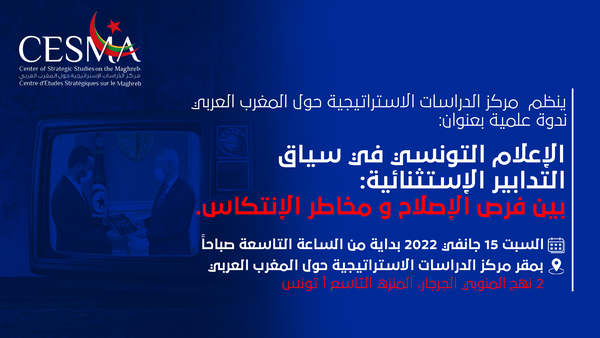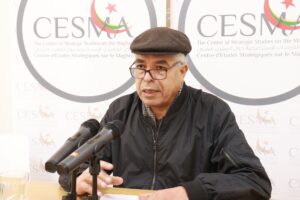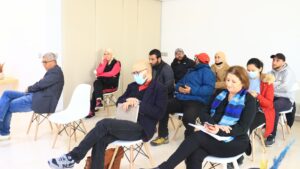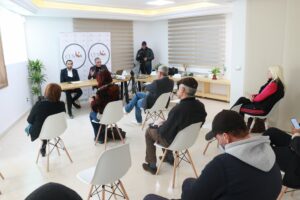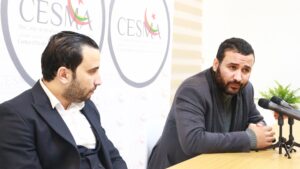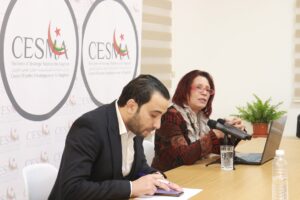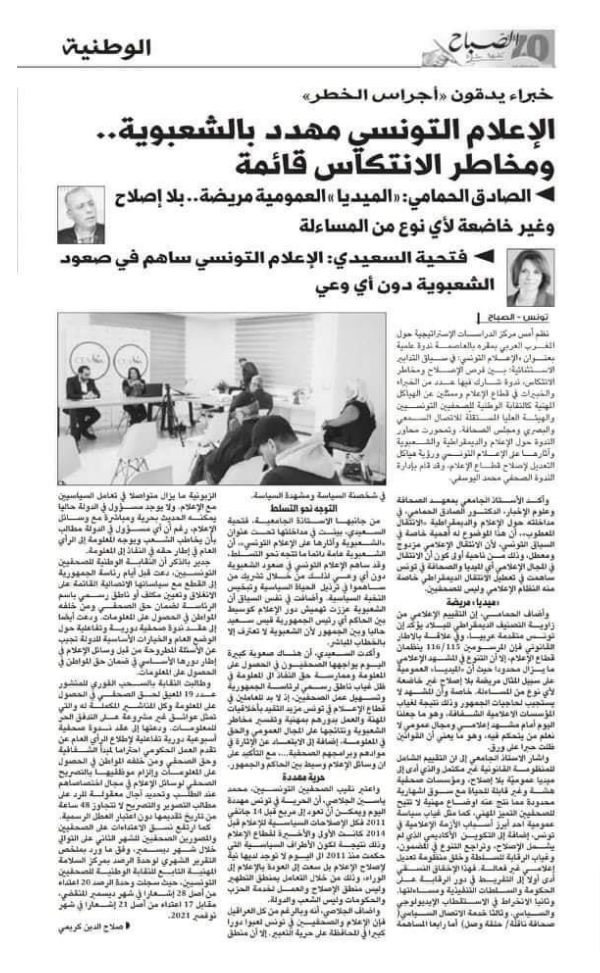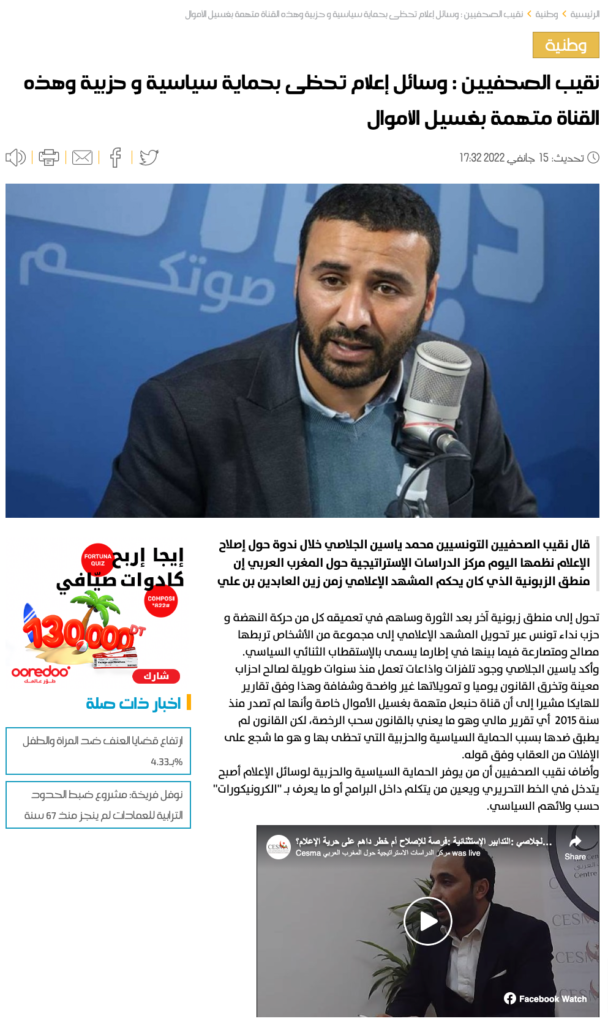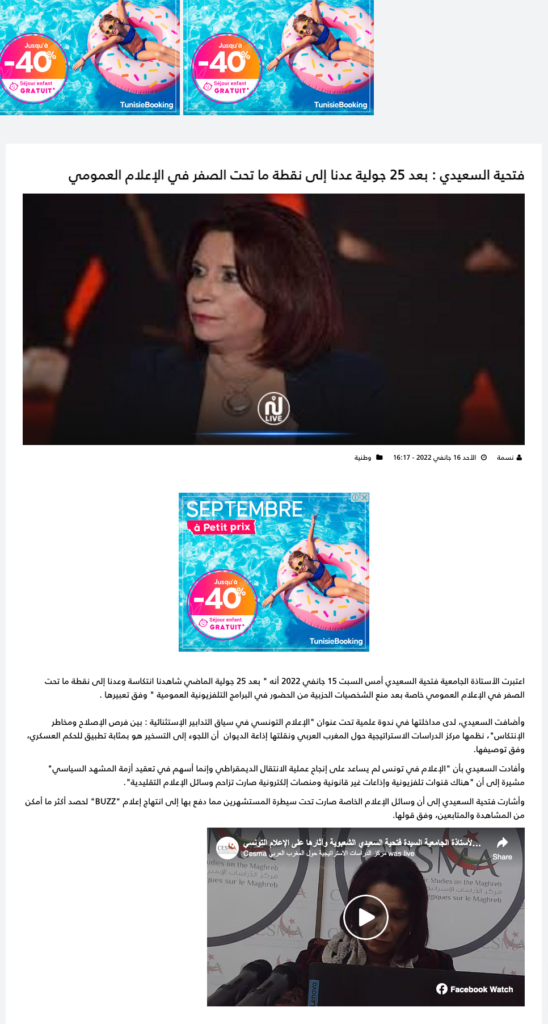Maghreb Center for Strategic Studies, January 15, 2022
The situation of the Tunisian media during the exceptional measures that Tunisia has been going through since the turning point of July 25, 2021 represents an important subject that deserves examination and reflection, not only from the angle related to freedom of the press, but also in relation to the future of the sector as a whole from a legal, professional, intellectual and societal point of view.
Over the past decade, the Tunisian media scene has been characterized by a slowdown in the path of reform due to the absence of a clear public policy in this direction, despite what has been achieved in terms of pluralism and the unprecedented margin of freedom in the country’s history recognized by international bodies such as Reporters Without Borders, in addition to the creation of the Press Council and the regulatory role played by the HAICA.
It became clear, after the announcement by the President of the Republic, Kais Saied, of the exceptional measures, that a state of confusion appeared in the media treatment of the new political situation imposed by the activation of Article 80 of the Constitution, in addition to the publication of Presidential Order no. 117. The structures of the profession, in particular the National Syndicate of Tunisian Journalists, drew attention to the same points.
Reflecting on the role of the Tunisian media in the current context characterized by exceptional measures and the state of societal and political division opens wider doors to discuss the future of this sector and the legislative code (decrees 115 and 116) regulating the media since 2011.
At a time when media professionals are calling for the need to launch a reform workshop in order to avoid the shortcomings of the last decade so that the Tunisian media live up to the social responsibility entrusted to them as major player in the public sphere, the approaches seem different.
An assessment of the recent past is necessary to measure what needs to be done to guarantee press freedoms and the right of access to information, and to establish the independence of the media vis-à-vis political actors, so that they can play their role as the fourth estate.
This professional and academic debate on the Tunisian media, public and private, is part of the context of a complex structural crisis that the sector is suffering. It is to be noted that the media’s relationship to the public is plagued by many ambiguities, particularly manifested in the low level of confidence highlighted by opinion polls.
From this angle, this seminar raises a number of tense issues for debating the role of the media at a time of exceptional measures which have imposed a new political roadmap which in turn should lead to a popular referendum and premature legislative elections at the end of the current year 2022. A year that will be full of challenges that will be faced by various players in the media field, between what is cyclical and what is strategic.
Can we be certain of the failure of the media transition and the reforming experience in Tunisia? And what is the responsibility of the media in the pitfalls of the democratic transition which led to the turn of the exceptional measures? Is it scientifically objective to claim that the media has corrupted the democratic experience while obliterating the role of politicians and political parties? How to assess the effects of exceptional measures on media life in recent months? And what will be the relationship of the President of the Republic, Kais Saied, with the media and the structures of the profession in the next stage, in the light of the broad powers he currently has and given the criticism directed against his communication policy?
To what extent does populism represent a threat to the freedoms of the press and the media, qualified as instances of mediation between society, political actors and elected institutions whose role is considered by populists to be over? Does the current political situation threaten the very existence of the press as a counter-regulatory authority in the face of the global crisis that the sector is going through? What is the horizon for media reform to establish quality journalism in the midst of the exceptional political situation that the country is going through? And what role should the media play in the next stage, in relation to the political, social and economic issues on the agenda of the state and society?
The program:
* Sadok Hammami: Media and democracy: the broken transition.
* Fathia Saidi: Populism and its effects on the Tunisian media.
* Sakina Abdel Samad: Perceptions of audiovisual media reform at HAICA.
* Mondher Cherni, researcher in the field of media laws: the legal framework of the media under the state of exception.
* Mohamed Yassine Jelassi: Exceptional measures: opportunity for reform or imminent threat to media freedom?

